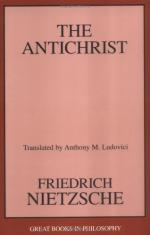|
This section contains 7,893 words (approx. 27 pages at 300 words per page) |

|
Although trained as a philologist, Friedrich Nietzsche has been among the philosophers most influential upon European and North American culture and philosophy during the twentieth century. While he has always had an audience among writers, artists, and Germanists, through the first half of the twentieth century—and especially among philosophers—Nietzsche was read and discussed primarily by German philosophers, including Martin Heidegger, Karl Jaspers, and Karl Löwith. His criticisms of traditional philosophical positions, along with his often metaphorical and hyperbolic writing style, led to his being taken much less seriously by English-language philosophers. And Nietzsche's political views and the posthumous appropriation—many would argue misappropriation—of some of his ideas by thinkers associated with fascism and National Socialism (Nazism) led initially to a hostile response to his works among many British and French readers.
By the early 1960s, however, Nietzsche's fortunes had begun...
|
This section contains 7,893 words (approx. 27 pages at 300 words per page) |

|


